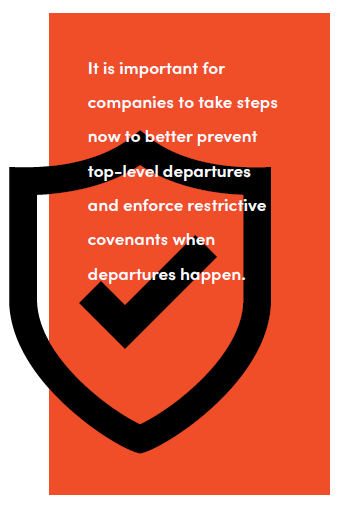One of the biggest crises that a network-marketing company can face is the departure of one or more top-level distributors to another network-marketing company. Typically, when one or more of these important distributors depart, it is because they have been lured away by a competitor that promises vast financial reward. The catch is that to reap such financial rewards the departing distributors must persuade most of their organization to join them at the competitor company. When such a distributor is successful, the distributor’s former company can face a material drop in revenues and profits overnight.
The traditional solution, of course, is to include noncompetition and nonsolicitation provisions in distributor agreements that prevent a distributor from departing and soliciting other distributors to join them. As trial lawyers who are brought in to enforce such agreements, we have encountered numerous problems with noncompete and nonsolicitation provisions in distributor agreements that could have been easily fixed when the agreement was drafted. Issues often arise because laws on the enforceability of restrictive covenants vary significantly from state to state, and the legal landscape is constantly evolving. Also, some noncompetes simply apply too general an approach, which creates enforceability problems and could even cause problems under other laws governing employee misclassification.

Although every company should ensure that experienced counsel has reviewed and revised its noncompete and nonsolicitation agreements in the context of the company’s broader distributor agreement, here we provide a few recommendations that, in our experience, can provide better protection for companies when top-level distributors depart.
A Two-Tiered Approach
State laws on restrictive covenants vary greatly. In the states that bar them almost entirely, companies must get creative with their agreements. But even in the states that allow enforcement of such provisions more broadly, companies still must narrowly tailor such restrictions not to go beyond protecting the company’s legitimate interests, which is chiefly to prevent unfair competition through the misuse of confidential information by competitors.
Another important consideration for direct sellers is that restricting distributors’ ability to work with other network-marketing companies—even direct competitors—may increase the risk that a court will find a company’s independent distributors to be misclassified employees. In some of these states, the greater amount of control over current and former distributors through such agreements, the more likely that a court will find a distributor to be a misclassified employee. Even worse, in other states, the so-called “ABC Test”—most famously adopted by the California Supreme Court’s 2018 Dynamex Operations West v. Superior Court of Los Angeles decision—will apply. Prong C of that test assumes that if a worker is an independent contractor rather than an employee, he or she will be customarily engaged in business of the same nature as the work performed for the “hiring” entity. In other words, distributors must not only be permitted to perform work for other “hiring” entities, but they must actually do so in practice.
On the other hand, direct sellers, like other businesses, can and must take reasonable steps to prevent competitors from discovering and utilizing their trade secrets and other confidential information via defection by top sales leaders. One strategy to reconcile these two seemingly conflicting principles is to adopt a two-tiered approach to restrictive covenants:

TIER 1
All distributors, regardless of rank, should be allowed to work with other direct-sales companies—subject to certain rules and restrictions, such as prohibiting distributors from promoting another company’s products or business opportunity at the same time as, or in conjunction with, the company’s own products or opportunities.
TIER 2
Distributors who achieve a certain level or rank (generally, any rank at which distributors gain access to confidential information, such as downline distributor data and other company trade secrets) should not be permitted to work with directly competing companies. The distributor agreement should reasonably define what a competing company is (i.e., any company that sells products that directly compete).
A company should also impose more stringent nonsolicitation requirements on higher-level distributors, such as preventing them from recruiting other distributors and customers to work with a different network marketing company. Such agreements still must be narrowly tailored and linked to the confidential information that the departing distributor had access to. For example, nonsolicitation agreements that bar a distributor from soliciting all the company’s distributors are problematic; rather, the agreement should be limited to those distributors that the departing distributor gained confidential information about in the year prior to termination.
But remember, the devil is in the details, and it is essential that counsel with expertise in restrictive-covenant enforcement and direct-selling issues carefully review your agreements.
Carve Out to Arbitration Requirement for Injunctive Relief
An ironclad dispute-resolution provision that requires distributors to resolve any claims against direct sellers on an individual basis in binding arbitration is one of the most important ways for companies to protect themselves from expensive, burdensome, and potentially “bet-the-company” class-action lawsuits. But sometimes, these provisions can create obstacles for companies needing to act quickly to seek expedited injunctive relief to prevent downline raiding when a top distributor departs.
It is thus important that the arbitration provision have a limited carve out so that a company may seek temporary injunctive or other equitable relief to protect itself from irreparable harm while an arbitration is pending, or even before an arbitration is filed. When enforcing noncompete and nonsolicitation agreements, speed is everything, because damages are often very difficult to calculate and may leave the injured party without an adequate remedy at law. Although arbitrators may award injunctive relief if provided by the parties’ agreement, the arbitral process is too slow and procedurally burdensome to provide immediate restraint.
Distributor agreements should thus provide for express carve outs from arbitration for claims seeking temporary restraint and injunctive relief. For any claims for permanent injunction, a company may decide that those claims should also be decided by a court. Critically important too in preventing an opposing party from blocking temporary restraint and injunction is for the agreement to provide that the court, not an arbitrator, decide whether a claim brought before it is subject to the carve out for claims seeking temporary relief.
By including this carve out for temporary restraint, a direct seller can ensure that it can swiftly protect its rights under a nonsolicitation and noncompete agreement, while at the same time protecting itself from class-action and other multi-plaintiff lawsuits.
State-Specific Strategies and Utilization of Venue-Selection Clauses
Lawyers typically think of choice-of-law provisions as designating the substantive law that will govern an agreement, while venue-selection clauses are typically thought of as a pre-negotiated location for the convenience of one or more of the contracting parties where any disputes must be litigated. But when it comes to restrictive covenants, venue and choice-of-law provisions are extremely complicated. That is because many states with pro-employee laws that bar the enforceability of noncompete and nonsolicitation agreements also bar the enforceability of venue and choice-of-law clauses that would have the effect of enforcing an otherwise unenforceable noncompete or nonsolicitation agreement in the state. Indeed, courts in states such as California will often refuse to enforce an injunction entered against a California resident that was obtained in another state under a choice-of-law-and-venue provision.
Because of these issues, it is a good strategy for a company to have varying provisions for residents of states with such laws. For example, in the distributor agreements that we draft, we often include carve outs from the general noncompete and nonsolicitation provisions in the agreement for distributors who are California residents. However, because California will allow the enforcement of nonsolicitation agreements to the extent necessary to protect trade secrets and confidential information, we draft very specific language that governs nonsolicitation restrictions for California residents. But this is just one example for one state. There are numerous other strategies that can and should be employed for distributors who reside in other states, and they are too numerous to detail in this brief article.
In sum, it is important to think strategically and creatively about choice-of-law and venue issues and not just assume that the law of the state and the venue in which the company’s home office sits will necessarily be the most favorable option.
Conclusion
We have seen an uptick in distributor departures and raiding activity in the direct-selling channel. It is important for companies to take steps now to better prevent top-level departures and enforce restrictive covenants when departures happen.



John C.C. Sanders is the Founding Partner/Dallas, Katrina G. Eash is a Partner and Chase Cooper is an Associate at Winston & Strawn LLP. Winston & Strawn LLP has extensive experience both in drafting restrictive covenants and in litigating claims based on them on behalf of companies across many industries, including direct sellers.
From the October 2021 issue of Direct Selling News magazine.


